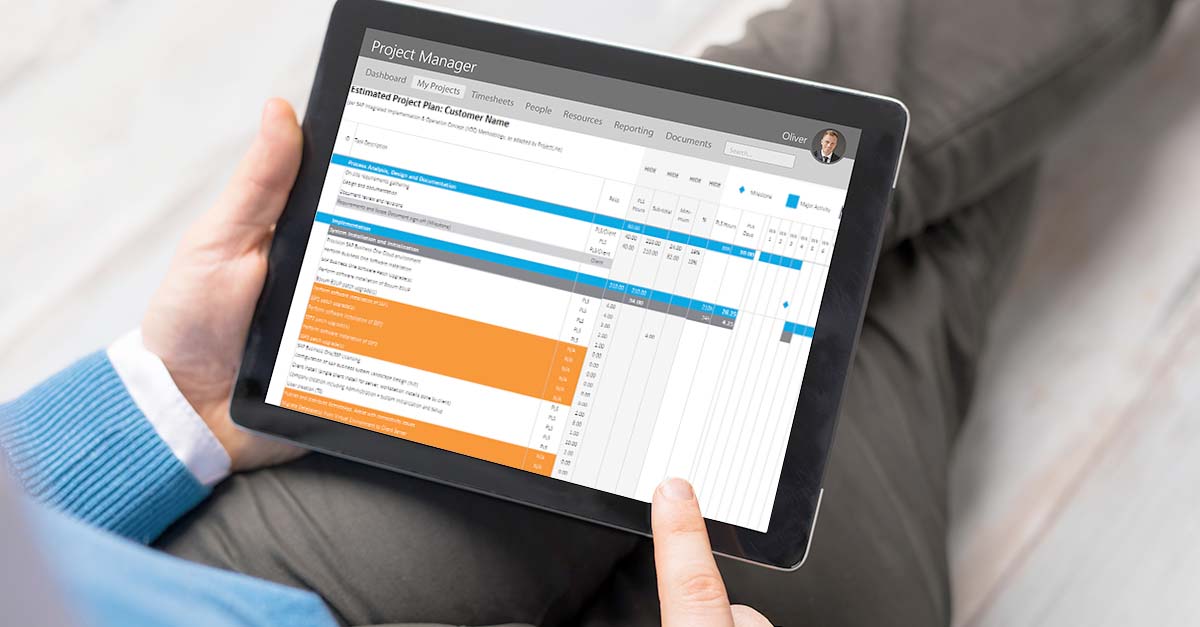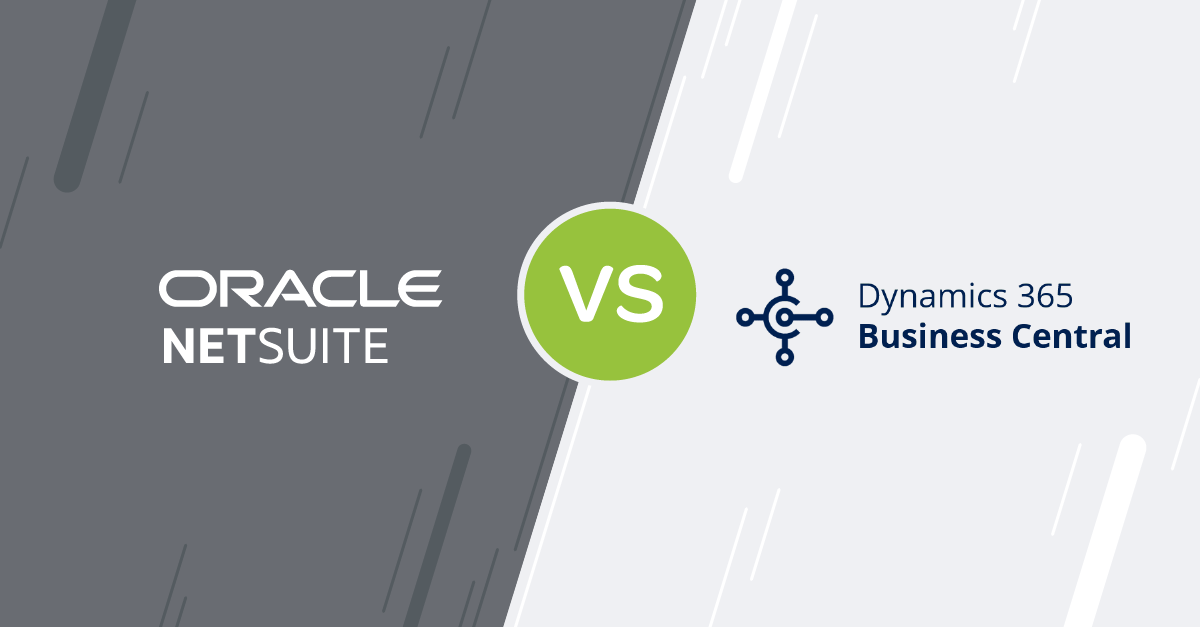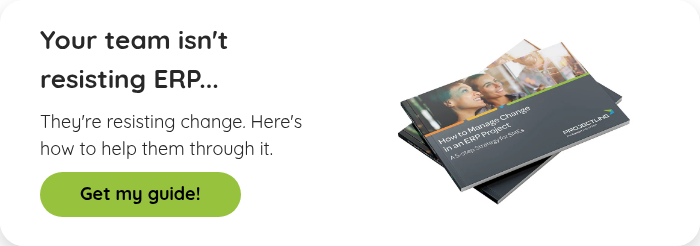Blog
Share this
7 Steps for a Successful ERP Implementation Project

by Carly Caines on April 02, 2025
So far in your ERP journey, you’ve probably been focused on the “what” – what system you choose, what functionality you need and what ERP partner you work with. You’ve put in the time and effort to select the best ERP solution for your business, but you’re not ready to take your foot off the gas just yet. How you handle the implementation will ultimately determine how successful the project is.
The details might differ based on your partner’s process, but here’s what you can generally expect to see in your ERP implementation plan:
1. Process analysis & system design
During your ERP evaluation, you did a discovery session with your ERP partner to uncover the key challenges in your business. Now, your ERP partner will go even deeper. They’ll work closely with you to refine those requirements, identify potential process improvements and design the system to meet your needs.
You’ll define how the new system will function at this stage, including any required customizations or integrations. This is also the time to challenge old ways of doing things. Moving inefficient processes into a new system won’t improve your business—so be open to adopting the best practices suggested by your ERP partner.
Once the system design is finalized, both you and your partner will sign off on the project scope before moving forward.
2. Software configuration
With the design complete, your ERP partner will configure the system. If you’ve chosen a private cloud ERP, this will involve setting up a hosted environment. For on-premise solutions, your partner will install the software on your company’s servers.
Configuration includes enabling the right modules, setting up system preferences and defining user roles and permissions. This step ensures the system is tailored to your business needs before data migration and process implementation begin.
3. Data migration
Data migration is often one of the most time-consuming aspects of ERP implementation—but it’s also one of the most important. Your team will clean your existing data before handing it off to your partner to import into your new ERP system.
Most companies underestimate the effort needed to properly clean and validate their data. It might seem like a good place to save time but resist the urge.
If you’re hoping your new ERP system will give you better visibility into performance and business health, you need quality data first. As the saying goes...garbage in, garbage out.
Here’s how to approach data migration effectively:
- Develop a data cleaning strategy — Treat this stage like a mini-project with timelines, responsibilities and deadlines.
- Assume your data needs heavy cleaning — As you’re reviewing your data, look for completeness, consistency, accuracy and duplication.
- Think carefully about what data you move — Not every piece of data will add value to your new system.
- Assign the right resources — The people working with the data regularly are best equipped to analyze it and correct errors.
- Define data standards — Identify inconsistencies in data types or formats. Set standards that you’ll enforce moving forward.
- Test thoroughly — Review every field to ensure the data is imported in the proper format, without errors.
4. Business process implementation
Now that your system is set up and your data is in place, the next step is to align the ERP with your business workflows. This involves configuring key business processes within the system, ensuring that user authorizations are properly set up, and generating reports and dashboards to provide real-time insights. Additionally, any necessary system customizations are implemented at this stage to fine-tune the ERP to your specific needs.
5. Training & user acceptance testing
A well-designed system is only as good as the people using it. ERP user training is essential to ensure everyone knows how to use the system effectively. If you need extra time here, take it. We know you'll be eager for go-live, but flipping the switch on your system before your team is comfortable will likely lead to pain down the road.
When your system is ready for testing, you’ll start with your super users (the primary system users that understand the end-to-end business processes) and other key functional users from each department. They’ll be responsible for working through your processes to ensure the system is doing what was expected. Make sure you test real-life scenarios using real transaction data to get an accurate picture of how the system will work once you’re live. If you’re coming from disparate systems, you’ll want to check that processes are flowing properly between departments, as that’s a departure from what you’re used to.
Your training approach should be tailored to different learning styles. Some users prefer hands-on training, while others benefit from video tutorials or written guides.
Consider using a combination of training strategies to ensure everyone has a solid understanding of how to use the new system and is ready for the change.
Setting your team up for ERP success
Here are a few simple things you can do to foster effective change:
- Identify your resistors and what's driving their resistance to change. Then create a plan to manage them.
- Share the why behind your ERP project. Focus on the positive impacts to your employees' day-to-day.
- Tailor your training program based on user roles, learning styles and skill sets.
- Communicate frequently and openly. Don’t leave your communication to chance – make a plan and stick to it.
6. System go-live
After all the planning and preparation, it’s time to go live on your ERP! First, here are a few tips to prepare for a successful go-live:
- Do a pre go-live review to ensure you’ve addressed any issues that came out of testing and training.
- Schedule your team appropriately. Let them know if they’re expected to work overtime or adjusted hours during go-live.
- Communicate with your team, customers and suppliers to let them know you’ll have scheduled downtime while you cut over to your new system. Put a plan in place for how you’ll handle incoming requests, orders, etc. during that period.
- Be prepared for the unexpected. Even with the best preparation, you can’t plan for everything.
Go-live is your official switch from your old system to your new ERP. Your partner should work with you to ensure your opening balances are imported correctly and help reconcile data between the two systems. Be sure to do a thorough review of your data at this point – missed errors can take time to fix down the road.
7. Post-implementation support & continuous improvement
In the weeks and months following your go-live, you’ll rely on your partner for support as you’re adjusting to your system. Their role is to make sure the system is functioning as expected and smooth the transition for your team. The post-implementation phase is critical to ensuring long-term ERP success.
Key areas to focus on after your ERP go-live
User Adoption
Monitoring user adoption is key—ensuring employees use the system correctly and efficiently will maximize its impact. Additional training may be required for teams that need further support.
ERP ROI Analysis
Evaluating your ERP’s return on investment (ROI) is also important. By comparing initial project goals with actual business outcomes, you can determine whether the system is meeting expectations and identify areas for improvement.
ERP Security & Compliance
Security and compliance should remain a priority long after go-live. Regularly reviewing user permissions ensures that employees only have access to the data and functions relevant to their roles, reducing security risks. Additionally, compliance requirements, whether industry-specific regulations or general data protection laws, should be reviewed periodically to ensure the ERP system remains aligned with legal standards.
Continuous Improvement
Over time, your business may evolve, and so should your ERP system. By continuously identifying opportunities for optimization, adding new functionality, and refining processes, you can ensure your ERP remains a valuable asset for years to come. Be sure to stay in touch with your ERP partner to explore enhancements and ensure your system continues to deliver value.
ERP implementation is a significant undertaking, but with a well-structured plan and the right ERP partner, you can set your business up for long-term success. By following these seven steps, you’ll maximize the value of your ERP investment and drive real business transformation.
Share this
Stay in the Know!
Join other SMEs who receive our monthly ERP insights, tips and best practices.
You may also like

ERP Funding for Canadian Businesses

Should You Work with a NetSuite Implementation Partner or Go Direct?



